Central wavenumber/wavelength: 10923.093 cm-1 / 0.915 microns
Comment: 5, channel 5 SRF from file MRIR_N2_chan5.txt received July 2019 from Thomas Hall
SRF data: rtcoef_nimbus_2_mrir_srf_ch01.txt
SRF plot: rtcoef_nimbus_2_mrir_srf_ch01.png
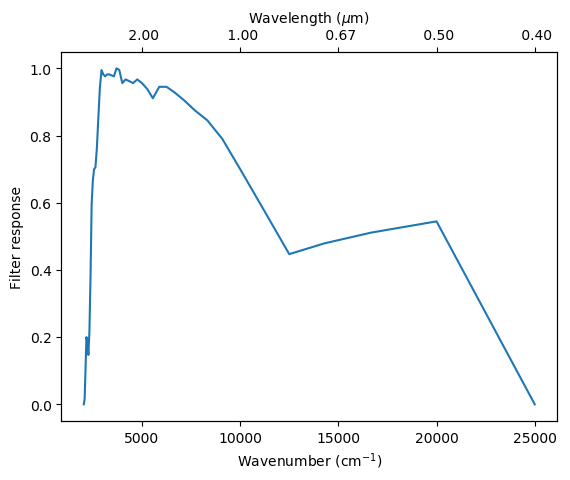
This file generated: 15/10/2019
Nimbus-2 Medium Resolution Infrared Radiometer (MRIR)
Nimbus-2 was launched on May 15, 1966
MRIR is a five-channel radiometer:
6.4 to 6.9 microns - This channel covers the 6.7 micron water vapor absorption band.
10 to 11 microns - Operating in an atmospheric "window," this channel measures surface
or near-surface temperatures over clear portions of the atmosphere.
14 to 16 microns - This channel, centered about the strong absorption band of C02
at 15 microns, measures radiation which emanates primarily from the stratosphere.
5 to 30 microns - This channel yields data from the spectral region containing the
broad rotational absorption bands of water vapor.
0.2 to 4.0 microns - This channel provides information on the intensity of the
reflected solar energy from the Earth and its atmosphere.
Nimbus 2 MRIR Data is available from 15 May 1966 through 28 July 1966.
SRFs digitized by Thomas Hall (t.w.hall@reading.ac.uk) July 2019.
Coefficients created for C3S 311c Lot 1 project.
Channel 5 truncated at 25500 cm-1 (0.4 microns)
Nimbus-2 Medium Resolution Infrared Radiometer (MRIR)
Nimbus-2 was launched on May 15, 1966
MRIR is a five-channel radiometer:
1: 6.4 to 6.9 microns - This channel covers the 6.7 micron water vapor absorption band.
2: 10 to 11 microns - Operating in an atmospheric "window," this channel measures surface
or near-surface temperatures over clear portions of the atmosphere.
3: 14 to 16 microns - This channel, centered about the strong absorption band of C02
at 15 microns, measures radiation which emanates primarily from the stratosphere.
4: 5 to 30 microns - This channel yields data from the spectral region containing the
broad rotational absorption bands of water vapor.
5: 0.2 to 4.0 microns - This channel provides information on the intensity of the
reflected solar energy from the Earth and its atmosphere.
Nimbus 2 MRIR Data is available from 15 May 1966 through 28 July 1966.
SRFs digitized by Thomas Hall (t.w.hall@reading.ac.uk) July 2019.
Channel 5 truncated at 25500 cm-1 (0.4 microns)
Central wave numbers are computed by the centroid method for channels 1,2,3 and 5
and deduced from the curve effective radiance / equivalent blackbody temperature
available in the Nimbus II users guide for channel 4.
Coefficients created for COPERNICUS CLIMATE CHANGE SERVICE (C3S 311c Lot 1 project).
Download all SRFs: rtcoef_nimbus_2_mrir_srf.tar.gz
|
Channel 01 Central wavenumber/wavelength: 10923.093 cm-1 / 0.915 microns Comment: 5, channel 5 SRF from file MRIR_N2_chan5.txt received July 2019 from Thomas Hall SRF data: rtcoef_nimbus_2_mrir_srf_ch01.txt SRF plot: rtcoef_nimbus_2_mrir_srf_ch01.png |

|
|
Channel 02 Central wavenumber/wavelength: 1510.039 cm-1 / 6.622 microns Comment: 1, channel 1 SRF from file MRIR_N2_chan1.txt received July 2019 from Thomas Hall SRF data: rtcoef_nimbus_2_mrir_srf_ch02.txt SRF plot: rtcoef_nimbus_2_mrir_srf_ch02.png |
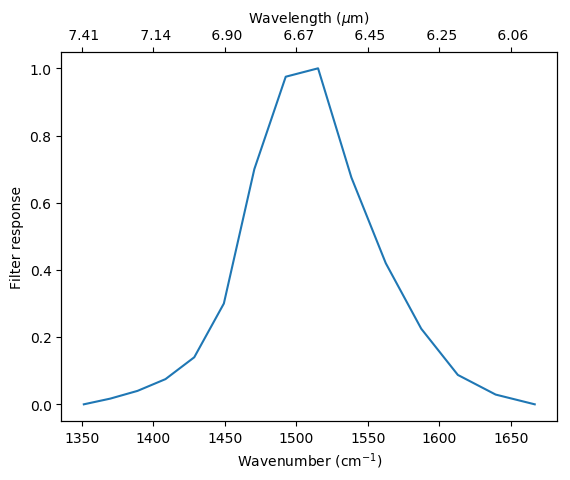
|
|
Channel 03 Central wavenumber/wavelength: 967.771 cm-1 / 10.333 microns Comment: 2, channel 2 SRF from file MRIR_N2_chan2.txt received July 2019 from Thomas Hall SRF data: rtcoef_nimbus_2_mrir_srf_ch03.txt SRF plot: rtcoef_nimbus_2_mrir_srf_ch03.png |
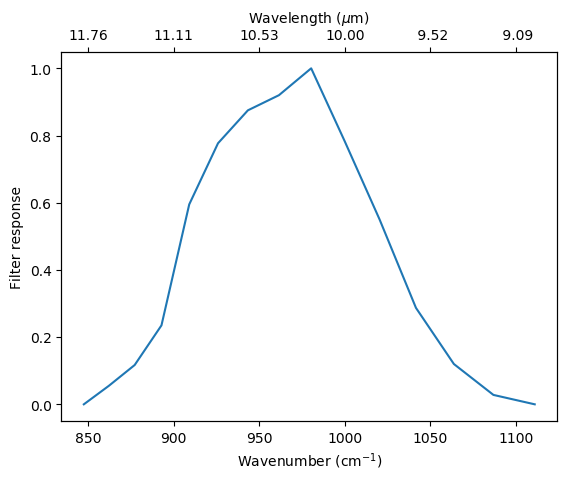
|
|
Channel 04 Central wavenumber/wavelength: 672.862 cm-1 / 14.862 microns Comment: 3, channel 3 SRF from file MRIR_N2_chan3.txt received July 2019 from Thomas Hall SRF data: rtcoef_nimbus_2_mrir_srf_ch04.txt SRF plot: rtcoef_nimbus_2_mrir_srf_ch04.png |
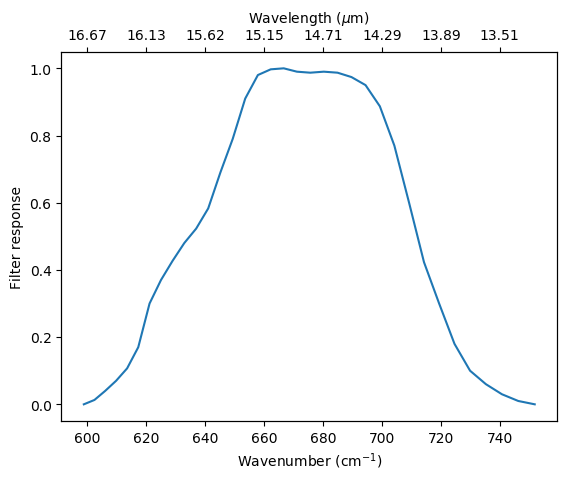
|
|
Channel 05 Central wavenumber/wavelength: 586.000 cm-1 / 17.065 microns Comment: 4, channel 4 SRF from file MRIR_N2_chan4.txt received July 2019 from Thomas Hall SRF data: rtcoef_nimbus_2_mrir_srf_ch05.txt SRF plot: rtcoef_nimbus_2_mrir_srf_ch05.png |
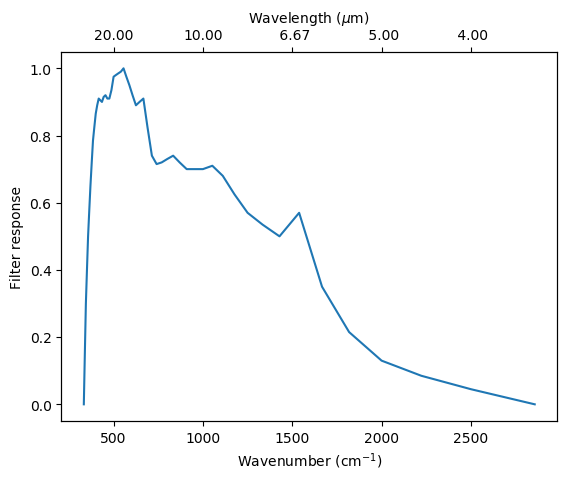
|